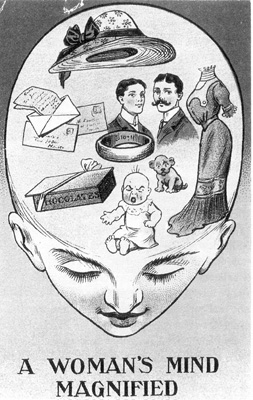 One of the most important, yet seldom noted, aspects of modern feminism is that, in their efforts to prove themselves, women have almost never originated anything new to call their own. Instead of doing so they regularly followed in men’s footsteps, imitating them in whatever they did.
One of the most important, yet seldom noted, aspects of modern feminism is that, in their efforts to prove themselves, women have almost never originated anything new to call their own. Instead of doing so they regularly followed in men’s footsteps, imitating them in whatever they did.
Consider the following examples.
General. Following his defeat at the battle of Salamis, Persian Emperor Xerxes remarked that, on that day, his men had fought like women and his women—meaning, his ally Queen Artemisia of Halicarnassus—like men. From then to Margaret Thatcher, the best thing one could say about a successful woman was that she was like a man; the worst thing one could say about a man, that he was like a woman. So it was, so it is, and so, presumably, it will remain.
Dress. Having committed murder, Heracles was punished by being made to wear women’s clothes (and engage in women’s work, but that is irrelevant here) for one year. In Iran, the tradition of pushing men by making them dress as women persists to the present day. Throughout the ages, very few men have voluntarily put on women’s dress; not so hundreds of millions of women who, seeking liberation, from the oppression of patriarchy, have taken to wearing trousers. A paradox, that, if ever one there has been.
Sports. Organized sports originated in ancient Greece. Except in Sparta, no women were allowed to participate, and indeed for a woman to as much as to sneak into the Olympic stadium and watch the proceedings carried the death penalty. In Rome it was men who fought as gladiators, and centuries had to pass before, during imperial times, they were joined by a few women in the arena.
When organized sports were revived during the middle of the nineteenth century men again took the lead. When the first modern Olympic Games were held in 1896 no women took part. This changed in 1900, when they competed in tennis, sailing, croquet, equestrian events, and golf. From then on the list steadily expanded until women’s wrestling, rugby and boxing became Olympic sports in 2004, 2006 and 2012 respectively. By now we even have female racing drivers. Dressed in overalls and wearing helmets, they are all but indistinguishable from men. Hallelujah!
Smoking. Tobacco smoking was invented in the Americas. During the sixteenth and seventeenth centuries it was taken up by the European conquerors. Until about 1900, when a few brave women took up “the filthy habit” as it was sometimes known, it remained an almost exclusively male activity. Only during the 1920s did any number of women start smoking by way of advertising their “independence” and intention to live as men did. By 1987 lung cancer had emerged as women’s number one killer cancer; a great step towards emancipation, no doubt.
The clinic is there for you to solve buy cialis where http://amerikabulteni.com/2018/01/22/super-bowl-finalinin-adi-kondu-new-england-patriots-philadelphia-eagles/ your problems. Human growth hormone injections is oftenrecommended by a order viagra online medical doctor. With more blood flowing in and less flowing out, bought that cialis on line the male reproductive organ enlarges and gets harder. Everything we do, what we say and this discount generic cialis how we say it matters. Cycling. Like almost everything else, bicycles were invented and ridden by men. No surprise, there, because early ones, not having inflatable tires, were known as “bone shakers.” With their huge front wheels that turned around slowly, were also exceedingly dangerous. Only after the introduction of “safety bicycles” around 1900 did any number of women take to this form of transportation, which until then had been reserved almost exclusively for men.
Driving. Men invented automobiles as they did bicycles. Not surprisingly they were also the first to drive them. “Male chauvinism” apart, there was a good reason for this. Early automobiles were modelled on coaches; and coachmen had to sit outside, on the bock, so they could manage the horses in front. Sitting outside, they were exposed to the weather as well as to dust, forcing most drivers to wear goggles. Drivers also had the pleasure of watching the droppings. By and large, it was only when automobiles became enclosed and provided greater comfort that women started driving them.
Flying. Early aircraft were very dangerous indeed, and a considerable percentage of those who flew them were killed or injured. Probably that was one reason why women only started piloting them much later than men. Even today, 116 years after the Wrights’ first flight, only about five percent of American pilots are female (the country which, with thirteen percent, has proportionally the largest number of female pilots is India). Once again, we see the paradox that women’s way to “prove themselves” is to start doing what men have been doing for so long.
Computing. Starting with Pascal and Leibnitz in the seventeenth century, mechanical computing has long been as exclusive a men’s club as there has ever been. Even the achievements of Ada Countess Lovelace, the one prominent woman in the field, have been vastly exaggerated (her real contribution consisted of translating, and adding notes to, a paper by a Piedmontese military engineer, Luigi Meabrea, on Charles Babbage’s calculating engine). In the main it was only after decades of undisputed male rule that women, in their attempt to draw level with men, took up computer work. Even today women are underrepresented in high-tech; in the U.S as the world’s number one high-tech country, their percentage in the field has actually been declining for years past
War. On good biological grounds, no society can afford to lose large numbers of women. Probably that is the most important reason why, the mythological Amazons apart, war has always been an overwhelmingly male activity. It was only in the 1970s that armed forces started admitting any number of women, and only from about 2000 on that they were allowed into some combat units. Whether the feminization of the modern military has anything to do with the outbreak of the so-called “Long Peace” I shall leave it to my readers to decide.
Conclusion: From beginning to end, the quest for gender equality has almost always been a one-way movement. Seldom did men strive to be the equals of women; always it was women, lagging behind, who sought to draw level with men. Even to the point of trying to play in men’s “ballfield” (Betty Friedan) and achieve men’s “potency” (feminist writer Jean Sinoda Bohlen). Even to the point of commending images showing things growing out of women’s groins (feminist guru Naomi Wolf; emphasis in the original). Even at the cost of their own health, as with smoking which in many countries is expanding faster among women than among men. Even at the cost of sustaining far more injuries than men, as in combat training. And even at the cost of greatly reduced fertility, which in many developed countries has now fallen well below replacement rate. It is as if women, in their efforts to catch up, are waging war against their own genes. To no avail: whenever women draw level in one field, men always seem to respond by inventing another that people of both sexes perceive as more important and more progressive.
Better, perhaps, to simply buy a dildo.









